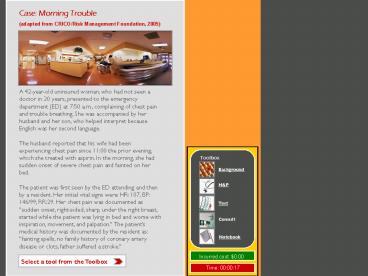Background PowerPoint PPT Presentation
1 / 8
Title: Background
1
A 42-year-old uninsured woman, who had not seen a
doctor in 20 years, presented to the emergency
department (ED) at 750 a.m., complaining of
chest pain and trouble breathing. She was
accompanied by her husband and her son, who
helped interpret because English was her second
language. The husband reported that his wife
had been experiencing chest pain since 1100 the
prior evening, which she treated with aspirin. In
the morning, she had sudden onset of severe chest
pain and fainted on her bed. The patient was
first seen by the ED attending and then by a
resident. Her initial vital signs were HR 107,
BP 146/99, RR29. Her chest pain was documented
as sudden onset, right-sided, sharp, under the
right breast, started while the patient was lying
in bed and worse with inspiration, movement, and
palpation. The patients medical history was
documented by the resident as fainting spells,
no family history of coronary artery disease or
clots, father suffered a stroke.
Toolbox
Background
HP
Test
Consult
Notebook
Incurred cost 0.00
Select a tool from the Toolbox
Time 000017
2
English as a second language
Click on a keyword for more information
Is there someone with a medical background who
can reliably interpret for the patient? Is
English the sons/husbands first language? Was
the history documented with the presence of an
interpreter other than family members? Was there
any ambiguity in taking the patients history?
A 42-year-old uninsured woman, who had not seen a
doctor in 20 years, presented to the emergency
department (ED) at 750 a.m., complaining of
chest pain and trouble breathing. She was
accompanied by her husband and her son, who
helped interpret because English was her second
language. The husband reported that his wife
had been experiencing chest pain since 1100 the
prior evening, which she treated with aspirin. In
the morning, she had sudden onset of severe chest
pain and fainted on her bed. The patient was
first seen by the ED attending and then by a
resident. Her initial vital signs were HR 107,
BP 146/99, RR29. Her chest pain was documented
as sudden onset, right-sided, sharp, under the
right breast, started while the patient was lying
in bed and worse with inspiration, movement, and
palpation. The patients medical history was
documented by the resident as fainting spells,
no family history of coronary artery disease or
clots, father suffered a stroke.
Toolbox
Background
HP
Test
Consult
Notebook
Incurred cost 0.00
Time 000135
3
English as a second language
Click on a question for more information
A reliable interpreter with a medical background
is not available.
Is there someone with a medical background who
can reliably interpret for the patient? Is
English the sons/husbands first language? Was
the history documented with the presence of an
interpreter other than family members? Was there
any ambiguity in taking the patients history?
Save in Notebook
A 42-year-old uninsured woman, who had not seen a
doctor in 20 years, presented to the emergency
department (ED) at 750 a.m., complaining of
chest pain and trouble breathing. She was
accompanied by her husband and her son, who
helped interpret because English was her second
language. The husband reported that his wife
had been experiencing chest pain since 1100 the
prior evening, which she treated with aspirin. In
the morning, she had sudden onset of severe chest
pain and fainted on her bed. The patient was
first seen by the ED attending and then by a
resident. Her initial vital signs were HR 107,
BP 146/99, RR29. Her chest pain was documented
as sudden onset, right-sided, sharp, under the
right breast, started while the patient was lying
in bed and worse with inspiration, movement, and
palpation. The patients medical history was
documented by the resident as fainting spells,
no family history of coronary artery disease or
clots, father suffered a stroke.
Toolbox
Background
HP
Test
Consult
Notebook
Incurred cost 0.00
Time 000209
4
Test
Blood gases
Chest X-Ray
Blood gases 110
Studies/Tests Angiogram Audiometry Biopsy Bone
Scan Cardiac Eval Cisternogram CT EEG ECG
EMG/NCS ENG Evoked Potentials Genetic Tests
Ischemic Exercise Test MRA MRI Muscle Biochem
Myelogram Neuropsych Testing Pap Smear
Pulmonary Function Schilling Test SPECT Scan
Tensilon Test Visual Fields X-rays
Lab Tests Blood cultures/ASTBlood
gases AcetoneArteritis (ANA)CBC CO2 CSFGlucose
PotassiumSodiumLiver (SGOT)Liver
(SGPT)StoolThyroid Urinalysis
HCO3 26 mEq/L pH 7.41 pCO2 45mmHg pO2 80 mmHg
Save in Notebook
Toolbox
Background
HP
Test
Consult
Notebook
Incurred cost 110.00
Time 000742
5
Test
ECG
Chest X-Ray
ECG 1,000
Studies/Tests Angiogram Audiometry Biopsy Bone
Scan Cardiac Eval Cisternogram CT EEG ECG
EMG/NCS ENG Evoked Potentials Genetic Tests
Ischemic Exercise Test MRA MRI Muscle Biochem
Myelogram Neuropsych Testing Pap Smear
Pulmonary Function Schilling Test SPECT Scan
Tensilon Test Visual Fields X-rays
Lab Tests Blood cultures/ASTBlood
gases AcetoneArteritis (ANA)CBC CO2 CSFGlucose
PotassiumSodiumLiver (SGOT)Liver
(SGPT)StoolThyroid Urinalysis
Click to enlarge
Save in Notebook
Toolbox
Background
HP
Test
Consult
Notebook
Incurred cost 1,110.00
Time 000854
6
Notebook
Chest pain Shortness of breath Stroke in family
history Absence of trained interpreter Age Aspirin
Gender
Background
Final vital signs Initial vital signs
HP
ECG No cardiac enzymes results Elevated
glucose X-Rays Blood gases
Test
Absence of cardiology consult
Consult
7
Notebook
Key Student
Chest pain Shortness of breath Stroke in family
history Absence of trained interpreter Age Aspirin
Gender
Background
Why does the student not consider these high risk?
Final vital signs Initial vital signs
HP
ECG No cardiac enzymes results Elevated
glucose X-Rays Blood gases
Test
Absence of cardiology consult
Consult
8
User Rating Profile in Case Progression
Profile of Students Rating during Case
Progression
Cumulative mean rating of risk value
accessed (Scale 1-5)
(High) 5
4
Student 6529
(Moderate) 3
2
What causes the profile to shift?
Baseline
(Low) 1
Time (seconds)
0
(Start)
(End)

